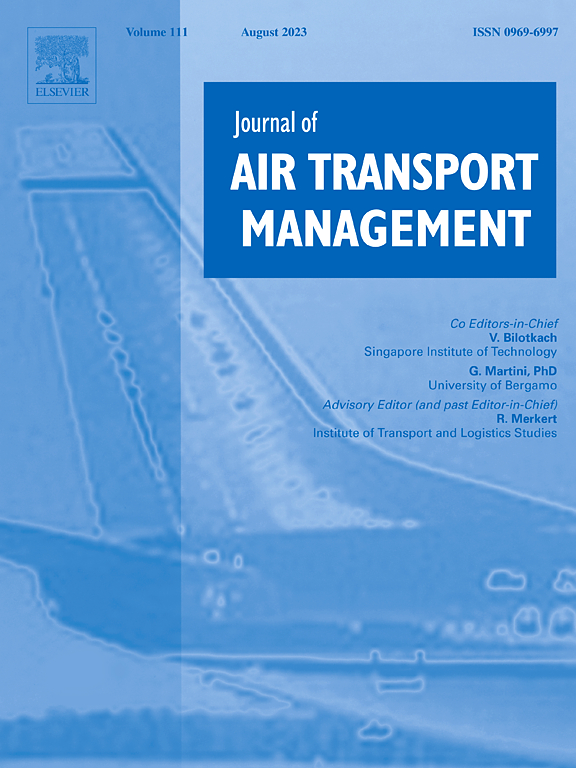Passenger perceptions of Artificial Intelligence in airline operations: Implications for air transport management
IF 3.6
2区 工程技术
Q2 TRANSPORTATION
引用次数: 0
Abstract
Artificial Intelligence (AI) is reshaping the aviation industry, driving efficiency, automation, and innovation across multiple operational domains. This study examines commercial airline passengers’ perceptions of AI’s role in addressing key industry challenges, including air traffic management, predictive maintenance, passenger experience, and sustainability. Using a quantitative approach, a survey was conducted among 320 airline passengers in Spain to assess their attitudes toward AI-driven applications in aviation. The findings reveal strong support for AI in optimizing flight operations, reducing delays, and enhancing security procedures. However, significant skepticism remains regarding AI’s autonomy in decision-making, particularly in pilot replacement and automated flight rerouting. Statistical analyses indicate that younger and frequent travelers exhibit higher confidence in AI’s potential, whereas older passengers demonstrate greater reluctance toward AI-driven automation. Additionally, AI is perceived as a crucial enabler of environmental sustainability, with respondents acknowledging its role in reducing fuel consumption and emissions. These insights provide valuable implications for policymakers, airlines, and technology developers seeking to align AI adoption with passenger expectations while ensuring safety, efficiency, and regulatory compliance. The study highlights the need for a balanced approach that integrates AI’s technological advancements with human oversight to foster trust and acceptance in the future of AI-powered aviation.
乘客对航空公司运营中人工智能的看法:对航空运输管理的影响
人工智能(AI)正在重塑航空业,推动多个运营领域的效率、自动化和创新。本研究调查了商业航空公司乘客对人工智能在解决关键行业挑战方面的作用的看法,包括空中交通管理、预测性维护、乘客体验和可持续性。采用定量方法,对西班牙320名航空公司乘客进行了一项调查,以评估他们对航空领域人工智能应用的态度。研究结果显示,人工智能在优化航班运营、减少延误和加强安全程序方面得到了强有力的支持。然而,对于人工智能在决策方面的自主性,特别是在飞行员替换和自动飞行改道方面,仍然存在很大的怀疑。统计分析表明,年轻和经常旅行的人对人工智能的潜力更有信心,而年长的乘客对人工智能驱动的自动化表现出更大的不情愿。此外,人工智能被认为是环境可持续性的关键推动者,受访者承认其在减少燃料消耗和排放方面的作用。这些见解为政策制定者、航空公司和技术开发人员提供了有价值的建议,他们希望将人工智能的采用与乘客的期望结合起来,同时确保安全、效率和法规遵从性。该研究强调,需要采取一种平衡的方法,将人工智能的技术进步与人类的监督相结合,以促进对人工智能航空未来的信任和接受。
本文章由计算机程序翻译,如有差异,请以英文原文为准。
求助全文
约1分钟内获得全文
求助全文
来源期刊

Journal of Air Transport Management
TRANSPORTATION-
CiteScore
12.40
自引率
11.70%
发文量
97
期刊介绍:
The Journal of Air Transport Management (JATM) sets out to address, through high quality research articles and authoritative commentary, the major economic, management and policy issues facing the air transport industry today. It offers practitioners and academics an international and dynamic forum for analysis and discussion of these issues, linking research and practice and stimulating interaction between the two. The refereed papers in the journal cover all the major sectors of the industry (airlines, airports, air traffic management) as well as related areas such as tourism management and logistics. Papers are blind reviewed, normally by two referees, chosen for their specialist knowledge. The journal provides independent, original and rigorous analysis in the areas of: • Policy, regulation and law • Strategy • Operations • Marketing • Economics and finance • Sustainability
 求助内容:
求助内容: 应助结果提醒方式:
应助结果提醒方式:


